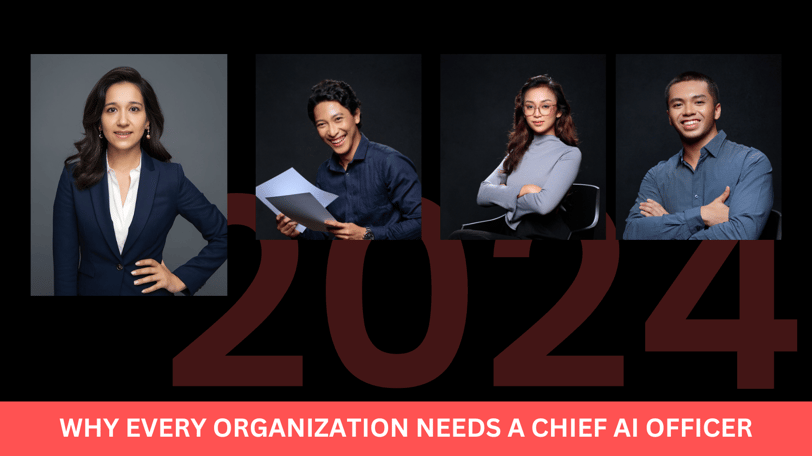Why Every Organization Needs a Chief AI Officer
Transforming Hospitality Through Strategic AI Leadership
SPECIAL


In the dynamic world of technology, the emergence of the Chief AI Officer (CAIO) marks a significant milestone for organizations striving to harness the full potential of artificial intelligence. As AI continues to revolutionize industries, the role of the CAIO becomes increasingly crucial in driving AI strategy, fostering innovation, and ensuring ethical implementation. This transformation is particularly evident in the hospitality sector, where AI's impact on customer experience, operational efficiency, and strategic decision-making is profound.
The Evolving Role of AI in Hospitality
The hospitality industry, traditionally focused on human interaction and personalized service, is now experiencing a paradigm shift with the integration of AI. From predictive analytics that anticipate customer preferences to AI-driven chatbots that enhance guest communication, AI is reshaping the guest experience in unprecedented ways. However, integrating AI into hospitality operations is not without challenges. Ensuring that AI initiatives align with business goals, maintaining data privacy, and addressing ethical concerns require a dedicated leader with a deep understanding of AI's capabilities and implications. Enter the Chief AI Officer.
Why a Chief AI Officer is Essential
The Chief AI Officer plays a pivotal role in navigating the complex landscape of AI implementation. Here are some key reasons why every organization, especially in hospitality, needs a CAIO:
Strategic Vision and Leadership: The CAIO sets the vision for AI within the organization, aligning AI initiatives with overall business strategy. This involves identifying opportunities where AI can create value, from enhancing customer experiences to optimizing internal processes. For instance, in the hospitality sector, AI can revolutionize guest experiences through personalized recommendations, predictive maintenance of facilities, and efficient resource management.
Building and Leading AI Teams: Effective AI implementation requires a diverse team of data scientists, engineers, and business analysts. The CAIO not only recruits top talent but also fosters a culture of innovation and continuous learning within the AI team. This leadership is crucial for driving AI projects that deliver tangible business outcomes.
Ethical AI Governance: With the increasing power of AI comes the responsibility to use it ethically. The CAIO ensures that AI applications adhere to ethical standards, promoting transparency, fairness, and accountability. This includes developing frameworks for responsible AI usage and addressing potential biases in AI systems. In hospitality, where customer trust is paramount, ethical AI governance is essential for maintaining a positive brand reputation.
Stakeholder Engagement and Communication: The CAIO acts as a bridge between technical teams and non-technical stakeholders, translating complex AI concepts into actionable insights. This role is crucial for securing buy-in from executives and ensuring that AI initiatives receive the necessary support and resources. Effective communication by the CAIO can demystify AI and highlight its strategic value to the organization.
The Strategic Impact of a CAIO
The appointment of a CAIO is not just a trend but a strategic necessity in today’s AI-driven world. Here’s how a CAIO can make a significant impact:
Enhanced Customer Experience: By leveraging AI, the CAIO can drive initiatives that personalize guest experiences, making them more memorable and satisfying. Predictive analytics can anticipate guest needs, while AI-powered chatbots can provide instant support, enhancing overall customer satisfaction.
Operational Efficiency: AI can optimize various operational aspects, from energy management to staff scheduling. The CAIO can identify areas where AI can reduce costs and improve efficiency, leading to significant operational savings.
Data-Driven Decision Making: The CAIO can harness the power of AI to transform data into actionable insights. This data-driven approach enables more informed decision-making, helping organizations stay ahead of market trends and customer preferences.
The Path to Becoming an AI Leader
To become an effective CAIO, one must combine technical expertise with strategic vision and leadership skills. Here are key steps to embark on this journey:
Understand the AI Landscape: Stay informed about the latest AI trends, technologies, and best practices. This knowledge will enable you to identify opportunities and anticipate challenges.
Develop a Strategic Mindset: Align AI initiatives with business objectives. Focus on delivering measurable value and driving innovation within your organization.
Cultivate Leadership Skills: Effective AI leadership requires strong communication, collaboration, and decision-making skills. Work on building these competencies to lead diverse teams and manage stakeholder relationships.
Prioritize Ethical AI: Ensure that your AI applications adhere to ethical standards. Develop frameworks for responsible AI usage and address potential biases proactively.
